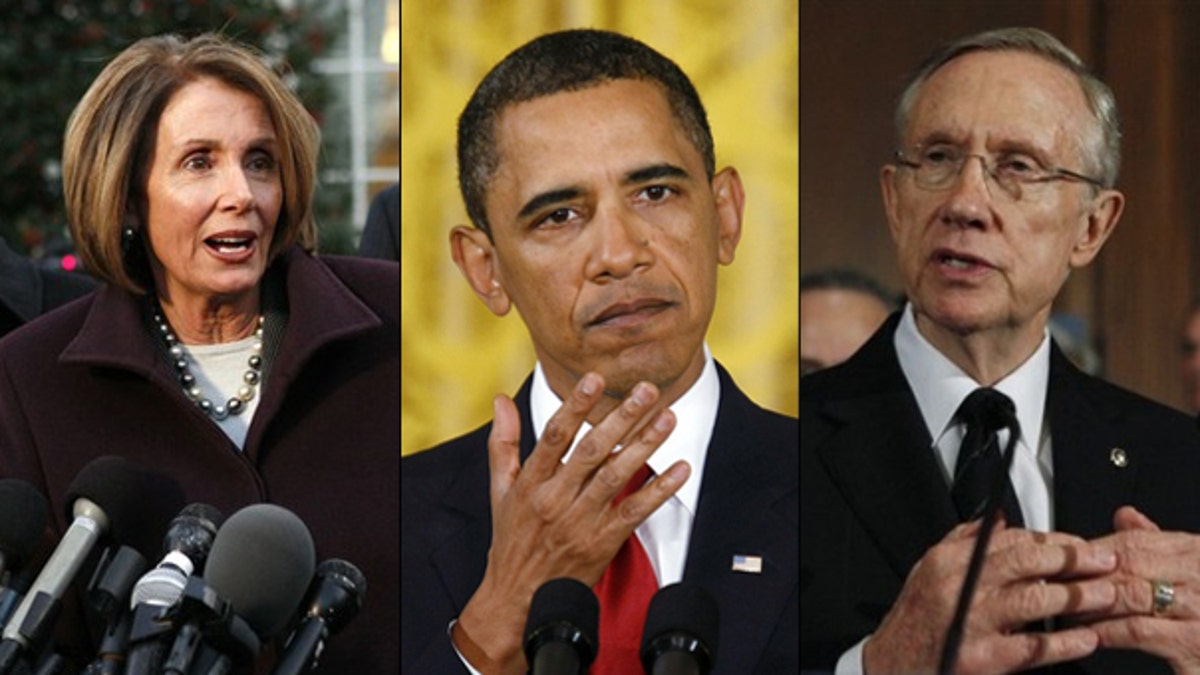
Shown here are House Speaker Nancy Pelosi, left, Senate Majority Leader Harry Reid, right, and President Obama. (AP/Reuters Photos)
Now or never.
That could be the rallying cry in the months ahead for Democrats looking to push through sweeping policy changes ahead of an election widely expected to cut into their majority in Congress.
Even if Republicans fail to make significant gains in the House, they need to net just one seat in the Senate to break the Democrats' 60-seat, filibuster-proof majority. And the announcements this week by Sens. Byron Dorgan of North Dakota and Chris Dodd of Connecticut that they will not seek re-election have given the GOP two more Democratic seats to target in November.
Though moderate Democrats are expected to be extra cautious in supporting agenda items like climate change legislation because of the political peril some face at home, the likelihood that 2010 will be the party's last best shot at passing the reforms President Obama campaigned on could make this year a veritable derby of "change" legislation.
"The Obama administration has known for a long time that they will never, and I mean never, have 60 votes in the Senate again," said Larry Sabato, director of the University of Virginia Center for Politics. "They will never, and I mean never, have a 40-seat majority in the House again. This is as good as it's ever going to get for them. They're going to get as much as they can get while they can get it."
Assuming Congress can clear health care reform off its plate in the coming weeks, Democratic leaders will be faced with a host of other agenda items to address, including economic stimulus, financial regulation, climate change legislation and immigration reform.
Some analysts expect Obama to choose his battles carefully, keeping a focus on the economy and national security, which has taken on fresh urgency in the wake of the failed Christmas Day terror attack on a Northwest Airlines flight.
Richard Socarides, former White House adviser to President Clinton, said Democrats will be faced with a choice -- to tread cautiously out of sensitivity toward the election, or to barrel full-speed-ahead because the party's over in November.
"Democrats would do well to focus like a laser beam on (the economy) between now and the midterms," he said. But he added that Democrats do best when they have an "ambitious agenda."
Socarides said Democrats might end up splitting the difference, focusing on the economy after health care, but also making "some effort" to reach an agreement on issues like climate change legislation and immigration reform. It's just a matter of how hard they push those other issues, he said.
"This effort on health care has taken its toll," he said.
A case in point is Sen. Ben Nelson -- the moderate Nebraska Democrat who was his party's last holdout on health care before the Senate passed the bill before Christmas. Nelson said this week that Obama should have delayed taking up health care to focus on the economy.
"I think it was a mistake to take health care on as opposed to continuing to spend the time on the economy," Nelson told the Fremont Tribune. "I would have preferred not to be dealing with health care in the midst of everything else, and I think working on the economy would have been a wiser move."
This kind of sentiment among moderates could make it difficult for Democratic leaders to push anything that's not economy-related.
Obama said in August that he expects Congress to tackle immigration in 2010. Sen. John Kerry, D-Mass., who is trying to forge a compromise package on climate change legislation with other lawmakers, said after the U.N. conference in Copenhagen last month that the summit "sets the stage for ... Senate passage this spring of major legislation at home."
Yet before the international deal, Kerry warned about the hurdles at home in Washington. He said that without a solid international agreement, it would be "exceedingly difficult" to persuade moderates to get on board with the kind of emissions-curbing legislation that passed the House months ago.
Obama, in an interview with CBS' "60 Minutes" last month, said he expects financial regulatory reform to get done in early 2010, and he pressed hard for a new jobs-creation package. There was no mention of immigration or climate change or any other issue that hovers over his head -- like the military's don't ask, don't tell policy barring gays from announcing their sexuality while serving.
Some Republicans say that no matter how hard Democrats try, issues like climate change and immigration legislation are dead in the water in an election year.
Sabato said that even health care reform is not a lock.
"A single Democratic switch could sink health care," he said. "It's possible that some of the more moderate Democrats will be asking themselves, 'Is this what I really want to run on?'"
FoxNews.com's Judson Berger contributed to this report.




